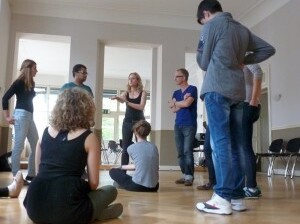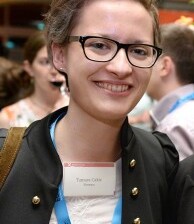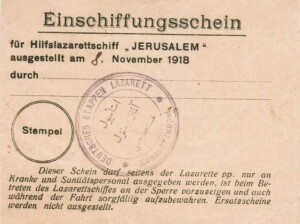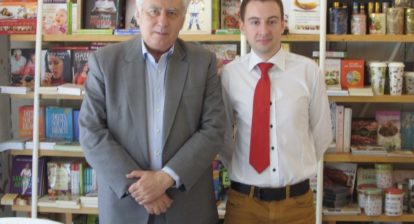Lotta Schneidemesser born 1987 Germany | Photo: private source
In Flanders fields the poppies blow
Between the crosses, row on row,
That mark our place; and in the sky
The larks, still bravely singing, fly
Scarce heard amid the guns below. […]
By John McCrae
This poem, written in May 1915 by Major John McCrae, was printed on a card that lay on each of the seats in the German Bundestag, where on the morning of July 3rd, 2014 an hour of remembrance celebration took place on behalf of the beginning of the First World War 100 years ago. The speaker who was invited to speak at this hour of commemoration was the French political scientist Alfred Grosser.
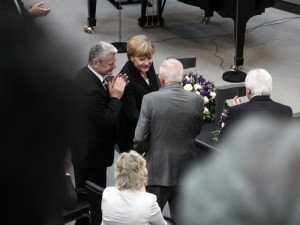
German Chanellor Angela Merkel and German Federal President Joachim Gauck with Alfred Grosser | Photo: Johannes Julius Mohn
High ranking German politicians and influential members from different areas of society were present, as well as the representatives of more than one hundred countries and embassies, and also a group of young people, many of them HistoryCampus’ participants and alumni from the Eustory-Network.
“What is World War One to us?“
Mr. Norbert Lammert, President of the German Parliament, held the introductory speech – a short, poignant speech, in which he managed to raise fundamental points, and capture the audience without repeating mere catchphrases and taking too much in advance from the speaker that he was introducing.
In his speech, he repeatedly raised the question “Was geht uns der 1. Weltkrieg an?” (“What is WWI to us?”) underlining that other nations might be able to answer this question differently and maybe more straight-forward than Germany, and that in Germany, the remembrance of WWI is often over-shadowed by WW II. Nevertheless, WWI has, of course, left deep marks in the German history in many ways, among others, it ended the era of the German Kaiserreich (1871-1918) and gave way to a new form of government: A German democracy.
Mr. Lammert recalled the enthusiasm for the military during the time in the German Kaiserreich and the way of escalation that eventually led to the outbreak of WWI – and later to WW II. Here, he interconnected the past with the present, giving his very own answer (one of so many that could be given) to the question that he had risen earlier (“What do we have to do with WW I?”), saying that: “Only much later have we learned that military measures are on principle never an adequate way for politically intended changes.”
The President touches a very sensitive topic: German military intervention
With this statement he directly referred to the current debate in Germany with regard to conflicts such as in Ukraine, where the question of the role that the military could or should have to play has been very controversially debated in the German Bundestag. Some politicians, among them the German Federal President Joachim Gauck, argued that it is time that Germany, being one of the leading economic forces in Europe (and the world), took on more responsibility and supported nations that needed its help and support; that Germany should stand up to the violation of human rights or the violation of internationally recognised borders (as in Ukraine) – with armed forces, if need be.
The German Federal President made it very clear in his speech that he did not favour armed forces, that he did not call for military intervention and that he saw military force as the last possible means in the resolution of conflicts, if all peaceful negotiations had failed. Still, he had to endure a set of accusations and reproaches from many different politicians, members of society and various newspapers.
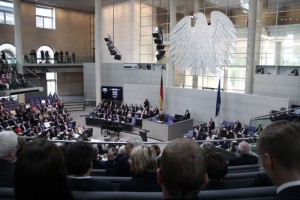
German Bundestag, hour of remembrance of WWI, July 3rd 2014 | Photo: Johannes Julius Mohn
Controversial Debates in the German Bundestag
Why? Because he touched on a very sensible nerve here – that Mr. Lammert summarised in his statement and that can be understood as follows: With regard to German history, in particular to the enthusiasm in German society for the military in the Kaiserreich as well as during the Nazi-period that eventually led to the outbreak of WWI and later WWII, and to the role that Germany played in these wars, Germany became over-sensitive to anything that has to do with military measures or military intervention.
As Mr. Lammert pointed out further in his speech, there are very controversial and lengthy debates in the German Bundestag about every military action that the German military participates in, and each single mission is decided upon by the German Parliament. And Germany was the very first nation that, as a consequence, recognized the right to conscious objection of military service as a human right.
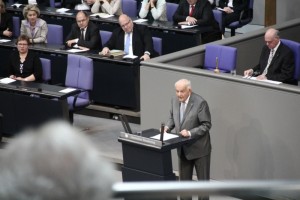
Alfred Grosser speaking to the Members of the German Bundestag | Photo: Johannes Julius Mohn
„We are the lucky ones – because we are the survivors“
Mr. Lammert ended his speech by introducing the guest of honour and speaker, 89-year-old French political scientist Alfred Grosser and quoting a statement that Grosser gave at an earlier time, reminding his listeners of the responsibility that we have today for the Europe we live in and for the preservation of peace and security:
“We are the lucky ones – because we are the survivors. Not only, because we are alive, but also, because through our work we can prevent death and suffering.”
In his speech at the German Bundestag, Alfred Grosser captured a wide array of different topics, from the causes of WWI to the Federal Republic of German as we know it today and he also referred to the German-French friendship and partnership and the development and specialty of this relationship.
Among others, Grosser raised the question that has been very prominently debated in Christopher Clark`s recently published book The Sleepwalkers: How Europe went to War in 1914 – namely the question of guilt and responsibility for the outbreak of WWI and for its consequences. Grosser pointed out that the result to which Clark comes is not, as so often said by the press and the public debate, a completely new one: Already in 1952, associations of French and German history teachers, observed that “all have been jointly responsible, but there has been one German exception: The meaning of the military in the German society.”
A broad picture of European History
Here, Grosser took up some of the points that Mr. Lammert mentioned in his speech and reflected on them further, often giving examples and comparisons between the development in Germany and in France, pointing out differences – but also things that both nations have in common.
In his speech, Grosser created a broad picture of European history and political development throughout the last century and underlined his own thoughts and reflections with a wide number of quotes by European politicians, writers and historians as well as people that have been his personal friends and companions for many years.
The whole commemoration ceremony lasted only about one hour. But the topics and questions raised, the quotes and the images still resonate in my mind. Whenever I now read the poem by John McCrae, I vividly remember this day and hour.
Video of the hour of commemoration: http://www.bundestag.de/dokumente/textarchiv/2014/kw26_ak_gedenkstunde/284380
The in flanders fields poem“ by John McCrae: http://www.inflandersfields.be/en/the-in-flanders-fields-poem

